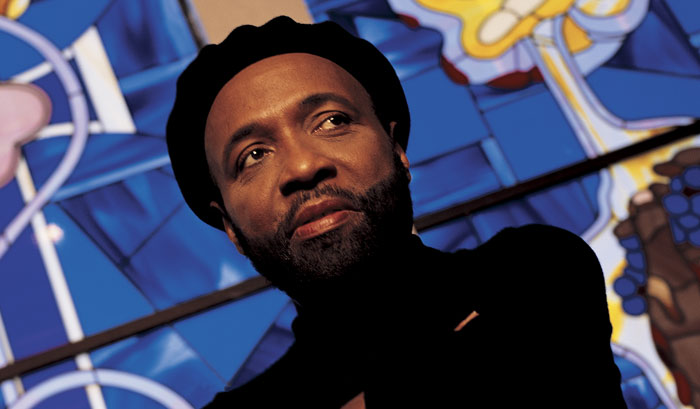


Pastor Andrae Crouch is one of the leading lights in contemporary gospel music. In addition to singing, playing piano and writing songs with his own group, he has performed and arranged backing vocals for a host of top artists, including Madonna, Michael Jackson, Elton John, Julio Iglesias, and Quincy Jones.
Young Andrae soaked up plenty of sacred music while growing up in his father's Los Angeles-area church. But other influences crept in as well, setting the stage for Crouch's cross-genre musicmaking in later years. "My father was a great appreciator of good music, period," he explains. "It didn't have to be the hymns of the church. He'd listen to Sam Cooke and Duke Ellington on the radio. Then in the other room my mom would be listening to classical music. So we got a good balance of musical influences growing up. Jazz, pop, everything."
I could write five songs a day on this keyboard, just getting ideas from the different sounds and colors and rhythms.
By his own account, Andrae's transition from listener to performer was dramatic: "I was about eleven, and I had never played the piano in my life. But one day in church, my father called me up and said, 'Start playing.' And I just started playing, while they were singing hymns. All of a sudden my ears seemed to pop open- I understood what the tonic note was and the key they were singing in. I didn't know what I was doing, but I just started hearing things."

Since then Pastor Crouch has developed a musical style that merges traditional gospel with pop, jazz and other genres. "It would be selfish to believe all the best music is played in the church," he says. "it's like the scripture says: 'All good and perfect gifts come from God.' If I hear a wonderful musician, it doesn't matter what he's doing or where he's doing it-it's just great music."
Crouch is pleased that there's greater interaction between pop and religious music these days. "I think everybody has borrowed from each other," he reflects. "Although in gospel we have a little more liberty in our interpretations than in pop music. We're a little less constrained by styles and trends. It's all about how a person feels in their spirit."
Crouch says he strives to make his music as welcoming and inclusive as possible: "With some religious music, it's almost like it's in code, with arcane biblical language that a newcomer might not understand. I make it personal-I say 'we' and 'us,' and put it into modern speech. I try to make people feel like they're part of it. To make it sound happy, like it's where they want to be. I like to write music where you can picture being someplace, and it doesn't have to be in church. it could be walking on the beach and feeling that way."
For both songwriting and performance, Pastor Crouch relies on his Yamaha Motif keyboard. "Thank God for Yamaha!" he says. "Eith this keyboard, I can play strings, horns, anything! It has some of the greatest instrument samples i've ever worked with. It has great horns, a good nylon guitar sound, and the strings are wonderful. And the piano is incredible! It sounds like the ultimate nine-foot grand."
Andrae praises the Motif's ease of use. "With a lot of keyboards, you've got to be a missile pilot to run them. But the Motif is so simply laid out-it's not like you have to be a genius to figure it out. I could write five songs a day on this keyboard, just getting ideas from the different sounds and colors and rhythms. I can record my ideas with the onboard sequencer, and suddenly I've got a new song! And the weighted keys on the Motif are so easy to play." In addition to his own recording and performance projects, Crouch has collaborated with some of the biggest names in pop music over the past few decades. So what was it like to work with artists like Elton John or Madonna?
"When I first worked with some of those people, I was a little intimidated, because I've admired some of them for such a long time," he confides. "Like when Quincy Jones asked me to do some stuff. I thought, 'No way! Not Quincy Jones, the Quincy Jones!' So I was a little hesitant at first to share some of my suggestions. But Quincy said, 'Don't put a blanket on your creativity, because I know you're not going to come up with rubbish.' So I told him my ideas, and he said, 'I love it!' It's wonderful to get that kind of respect for the gift that God has given me."
























